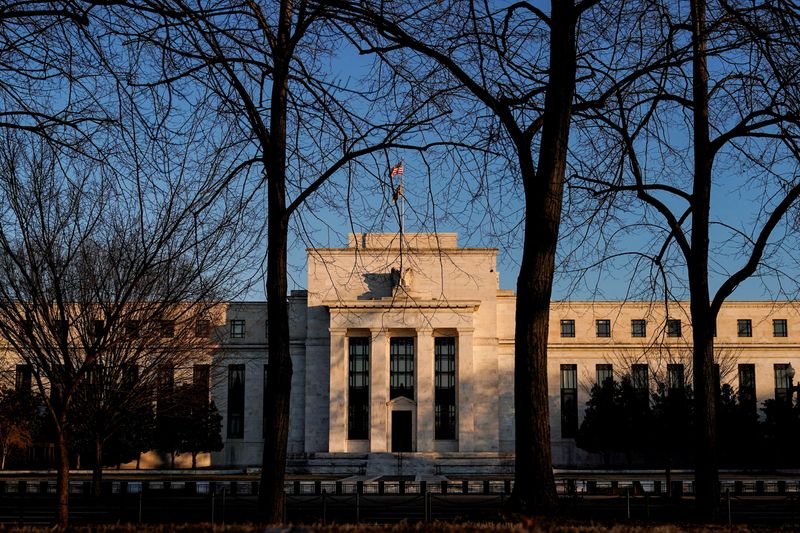By Jamie McGeever
ORLANDO, Florida (Reuters) - Hedge funds look to be scaling down their record short position in U.S. Treasury futures, marking the beginning of the end of the so-called 'basis trade' - an unwind that regulators have warned could pose severe financial stability risks.
With the Federal Reserve expected to begin cutting interest rates next year, perhaps as early as March, attention will intensify on the reversal of the lucrative trade for hedge funds when rates were rising.
The basis trade is a relative value trade where hedge funds exploit the small price difference between cash Treasuries and futures contracts.
They "short", or sell the bond future, and go "long", or buy the cash bond. The trade is funded in overnight repo markets and highly leveraged.
If the unwind is now underway, the question for authorities - and financial markets at large - is whether the $1 trillion position can be unwound in an orderly manner.
A 'soft landing', if you like.
The Bank of England this week was the latest financial authority to warn that a rapid unwind of such a large and highly leveraged position could lead to unwanted market volatility.
"Sharp (OTC:SHCAY) increases in volatility in market interest rates could lead to increases in margin required on the futures positions, or hedge funds may find it harder to refinance their borrowing in the repo market," the BoE warned.
"This, combined with any breaches of risk- or loss-limits, could force funds rapidly to unwind their positions ... which could amplify the market volatility," it said.
'DASH FOR CASH'
But an orderly unwind is possible, assuming overnight funding markets remain calm, funds' margin requirements aren't suddenly raised, and there is no unforeseen liquidity crunch or market shock that forces the Fed into emergency action.
If the Fed's rate cutting path is smoother this time around and financial market plumbing under the hood doesn't clog up, funds' exit from the basis trade should be smoother too.
"As long as we don't have an event that would compel the Fed to cut rates by 50 or 100 basis points, I don't think we will get a repetition of March 2020," Christoph Schon, senior principal of applied research at Axioma, said.
The BoE and others, including the Fed and the Bank for International Settlements, point to the March 2020 'dash for cash', when worries about the Fed's balance sheet, banking system reserves and the pandemic collided, as a warning of where it can lead.
But as an Office of Financial Research paper in July that year found, there was no evidence funds bailing out of basis trades due to margin calls and repo rate volatility actually added to stress in Treasury markets at that time.
CHIPPING AWAY
Schon points to the second half of 2019, when funds began reducing their then-record short position in Treasuries futures. Although repo market stress bubbled up late that year, the hedge fund unwind was fairly orderly, for the most part.
It only really became disorderly in March the following year when the pandemic hit.
Commodity Futures Trading Commission data show that the aggregate short position in Treasury futures held by leveraged accounts, the hedge funds most involved in the basis trade, recently reached record levels.
But they are starting to fall, most notably at the short end of the curve.
Funds have cut their gross short position in two-year futures three weeks in a row, and it increasingly looks like the record short of 2.65 million contracts in the week to Nov. 7 will prove to be the peak.
In net terms, the move has been even greater - the record net short of 1.716 million contracts on Nov. 7 has since been cut by more than 10%.
Leveraged funds trimmed their short position in the five-year space last week by 95,000 contracts, the biggest reduction in three months and one of the biggest this year.
The record short aggregate position worth a notional $1.008 trillion across two-, five- and 10-year futures in the first week of November has been chipped away, and is now worth $968 billion.
Javier Corominas, director of global macro strategy at Oxford Economics, believes the arbitrage opportunities in the repo market and the 'cash vs futures' bond spread that made the basis trade profitable have faded.

"(This) suggests that financial stability risks emanating from forced selling of U.S. Treasuries in an adverse bond market scenario have diminished," he wrote last month.
(The opinions expressed here are those of the author, a columnist for Reuters.)